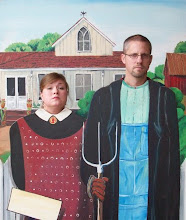Well, we've come to the end of the Gospel of Matthew. Chapter 27 is a very long chapter with many things to meditate on and learn from. I'll point out just a few things. Feel free to add your insights and comments as well.
The "spiritual" leaders of Israel continue in their hypocrisy. After Judas feels remorse for his act of treachery, he tries to return the money he was paid to betray Jesus. The chief priests and elders refuse to take back the money by kind of brushing him off. Judas throws the money down at their feet and then goes and hangs himself. So, what do they do? Of course, they can't put the money into the temple treasury! That would be wrong! Strange how they had no qualms about paying the "blood money" to Judas, but they somehow couldn't receive that same money into the "holy" treasury. Their hypocritical self-righteousness continues to dominate their lives!
Verses 24-25 contain some interesting ironies. First, Pilate, having failed to persuade the people to have him release Jesus, decides to "wash his hands" of the whole thing. Of course, that is impossible for him to do, for he is the one "in charge" of this whole thing. The mere washing of water does nothing to absolve him of this travesty that is taking place. Further, the outward washing of hands is not what Pilate needed most. He needed his heart washed inwardly. Second, the people's statement "His blood be on us and on our children!" is in one sense quite chilling. On the other hand, isn't that exactly what they need? Do they not need to have His blood on them in an atoning sense?
Verse 51 has long been a favorite verse of mine. The curtain of the temple, the one that separated the Holy Place from the Holy of Holies, is torn in two from the top to the bottom. Obviously, this is an act of God. But what does it symbolize? It symbolizes the end of the Old Covenant era. The end of the need for a physical temple. The end of the Levitical priesthood. The reason that this ended was that the sacrifice of Jesus on the cross satisfied once and for all the wrath of God against sin. Therefore, the temple sacrifices were no longer necessary. Jesus is now the one mediator between God and men, therefore the priests are no longer necessary. O, the blessings of being a child of God in the New Covenant era!
Chapter 28 closes the book with the victorious resurrection of Jesus and the Great Commission. I love this part of the story because it demonstrates the awesome power of Jesus Christ and because it give me the hope of my future resurrection. Something stood out to me this time around that I thought was significant. When Jesus appeared to Mary Magdalene and the other Mary, He told them to go tell His "brothers" to go to Galilee. Not His "servants." Not even His "disciples" or "followers," but His "brothers"! What a privilege to be a child of God and a joint-heir with Jesus Christ.
Jesus' last words lay out for us the mission of His church - to make disciples and to see to it that they know and do what Jesus had taught. By God's grace and with His power and for His glory may we be faithful disciple-makers until we die or He returns!
Friday, September 18, 2009
Subscribe to:
Post Comments (Atom)

No comments:
Post a Comment